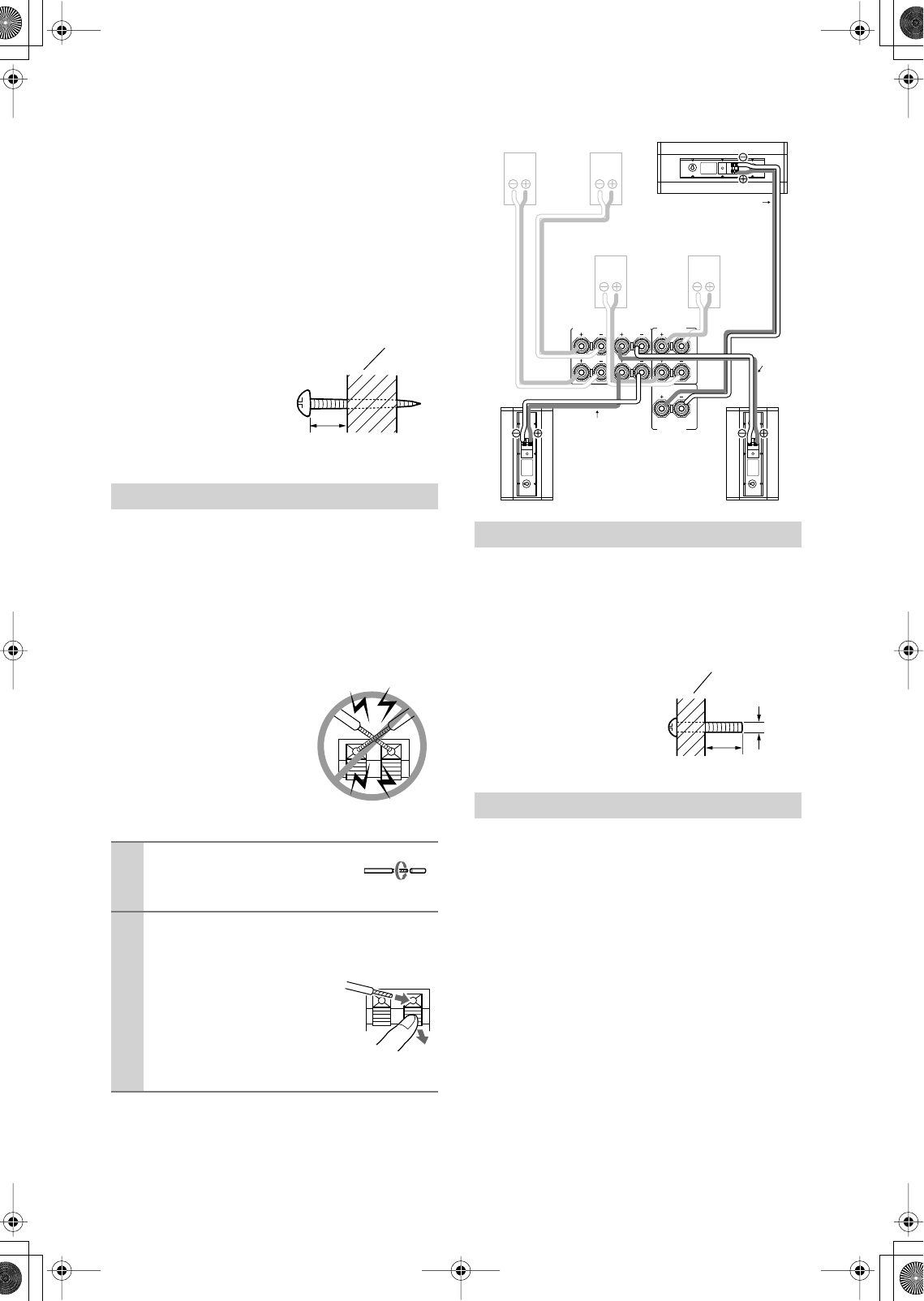
3
The plaque of each speaker rotates so that you can posi-
tion the speakers upside down.
Caution:
A mounting screw’s ability to support a speaker
depends on how well it’s anchored to the wall. If you
have hollow walls, screw each mounting screw into a
stud. If there are no studs, or the walls are solid, use
suitable wall anchors.
Use screws with a head diameter of 9.5 mm or less and a
shank diameter of 4 mm or less. With hollow walls, use
a cable/pipe detector to check for any power cables or
water pipes before making any holes.
Leave a gap of 5 mm
between the wall and the
base of the screw head, as
shown.
(We recommend that you
consult a home installation
professional.)
Read the following before connecting your speakers:
•Turn off your amp before making any connections.
• The nominal impedance of these speakers is 6
Ω
. Use
only an amp that supports this impedance.
•Pay close attention to speaker wiring polarity. Con-
nect positive (+) terminals to only positive (+) termi-
nals, and negative (–) terminals to only negative (–)
terminals. If the speakers are wired incorrectly, the
sound will be out of phase and will sound unnatural.
• Be careful not to short the
positive and negative wires.
Doing so may damage your
amp.
■
Connecting the Speaker Cables
Threaded inserts for 5 mm machine screws are provided
for wall-mounting with commercially available speaker
mounts and brackets (SKC-L500C: rear, SKM-L500S:
rear and buttom). Refer to the manual supplied with
your mounts or brackets for installation details.
Note:
The portion of the screw that
goes into the speaker’s
threaded insert should be
between 5 mm and 9 mm
long.
The speakers can handle the specified input power when
used for normal music reproduction. If any of the fol-
lowing signals are fed to them, even if the input power is
within the specified rating, excessive current may flow in
the speaker coils, causing burning or wire breakage:
1.
Interstation noise from an untuned FM radio.
2.
Sound from fast-forwarding a cassette tape.
3.
High-pitched sounds generated by an oscillator, elec-
tronic musical instrument, and so on.
4.
Amplifier oscillation.
5.
Special test tones from audio test CDs and so on.
6.
Thumps and clicks caused by connecting or discon-
necting audio cables (Always turn off your amplifier
before connecting or disconnecting cables.)
7.
Microphone feedback.
• The speakers contain strong magnets, so do not put
magnetic or iron objects such as screwdrivers close to
them. If you do, the object may be attached to the
magnets, causing personal injury or damage to the
diaphragm.
Connecting the Speakers
1
Strip the insulation from the
ends of the speaker cables,
and twist the bare wires tightly.
2
Use the cables to connect each speaker’s
input terminals to the corresponding
speaker output terminals on your amp.
To make a connection, while
pressing the terminal lever,
insert the wire into the hole, and
then release the lever.
Make sure that the terminals are
gripping the bare wires, not the insulation.
Wall
5 mm
Using Speaker Mounts/Brackets
Operating Precautions
FRONT
SPEAKERS
CENTER
SPEAKER
SURROUND
SPEAKERS
R
L
SURROUND BACK SPEAKERS
SKF-L500
Front right speaker
SKF-L500
Front left speaker
SKC-L500C
Center speaker
SKM-L500S
Surround
right speaker
SKM-L500S
Surround left
speaker
Gray
Green
Blue
SKR-L500
Surround back
speaker
SKR-L500
Surround back
speaker
5 mm
5–9 mm
Mount or bracket






